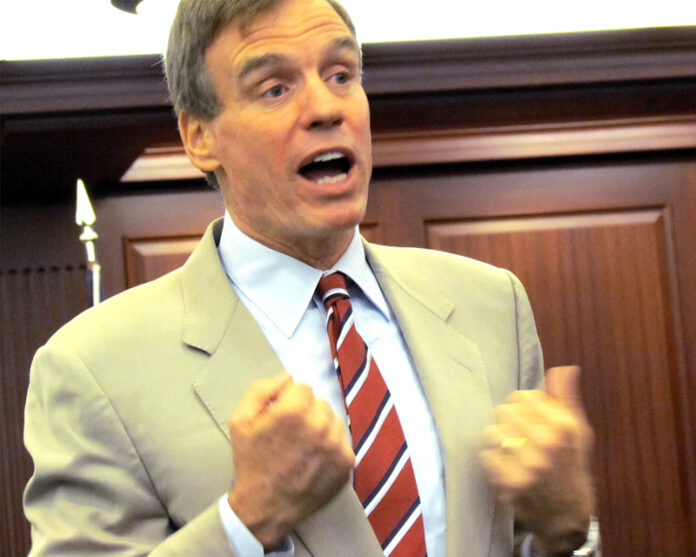
The already strained transportation funding in Virginia is “going to be exacerbated by the federal government,” said Virginia’s U.S. Senator Mark Warner. He was frustrated as he and VDOT commissioner Philip Shucet laid out the consequences in a conference call last week. “People will lose their jobs as funding expires,” Warner said.
At the last hour Congress agreed on a 90-day funding extension before they recessed. If they had not agreed on an extension taxes would have stopped being collected at the gas pump and there would have been no obligation for the companies to turn over the money to the government.
“It is just one more example of the dysfunction in Washington,” Warner said.
Last week the senate passed a two-year extension on a 74-22 bipartisan vote of the $109 billion highway transportation bill. “It wasn’t a perfect bill but it would have provided predictability for Virginia and for 90,000 jobs,” Warner said. Congress rejected it and an extension was the only option.
“You can’t write contracts with 90-days,” said Warner.
Funding of the nation’s infrastructure has always had broad bipartisan support in the past. “If we can’t get this done where are we headed?” asked Warner. Five years had been the tradition for transportation bills in the past explained Warner. Rep. Morgan Griffith agreed with Warner at least on the timeframe when he announced for reelection on Monday.
With a 90-day reprieve the funding impasse is now in conference. “This is no way to run an enterprise as large as the federal government with these short term extensions,” Warner said. “We saw the damage that was inflicted when we went through a similar battle with the airport systems because the FAA bill expired.” Taxes couldn’t be collected and revenue was lost or delayed.
Commissioner Shucet said, “there must be certainty in the construction program.” The state and the government should be working together as true partners. “These extensions just wreak havoc,” he said. It could result in increased cost for contracts, explained Shucet. “Nobody buys a house on the hope that they will be able to pay for it in 90 days.”
Warner thought the impasse could be resolved in 2-3 weeks but with only a 90-day extension he feared they would be right back in the same spot.
Warner accused the House of flip-flopping the funding timeframe from one year, five years and now 90 days. The House Republicans on March 18 defeated an attempt to force a vote on the $109 billion bipartisan transportation bill that was approved by the Senate.
Governor Bob McDonnell used GARVEE bonds for borrowing against future federal transportation entitlements to speed up work on Virginia highways. GARVEE bonds are a gamble against federal highway dollars that are not guaranteed to exist in the future, this plan would essentially lead to public IOU’s.
“The reason that GARVEE bonds sell at such a high coupon rate is because the expectation is very high that the federal government will pay its share of the transportation funding. If that’s put in jeopardy that gets factored into the coupon rate in the bond pricing,” said Warner.
Jeff Southard, a former VDOT commissioner and now executive vice president with the Virginia Transportation Construction Alliance, a trade association that represents the road building industry, said that the uncertainty could have a serious impact on employment, purchases and tax revenue. “If they don’t believe contracts are going to be let … they may look at temporarily shutting down,” said Southard.
Jason Bond a spokesman for Salem VDOT said it would be just as disruptive locally. Before they move forward with any contract they check to see if the federal and state funds are there. If the funds are not there “they delay it.” Bond said VDOT does the same thing before they actually execute the contract.
“It would be a huge impact on our ability to outsource our construction and maintenance work,” said Bond. It would even impact current construction depending on the contract.
“We’re counting on those federal dollars to be there in putting together our schedules of developing projects and developing our maintenance schedules and road work,” said Bond. “If we can’t count on those funds being there it really does halt and delay what we had planned to do. It all has to come together.”

